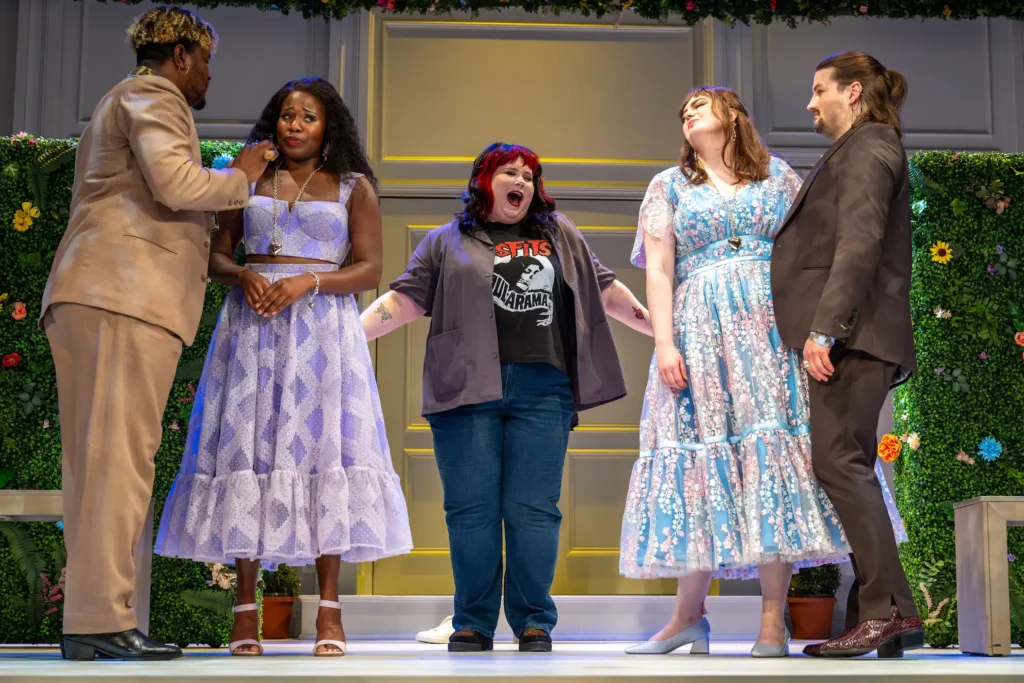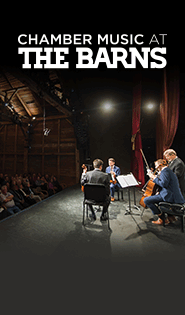Summer heats up operatically with revisionist “Così” at Wolf Trap

Lunga Eric Hallam, Renée Richardson, Emily Treigle, Erin Wagner, and Kyle White in Mozart’s Così fan tutte at Wolf Trap Opera. Photo: Shannon Flack
The first full day of summer brought oppressive heat, along with the start of the summer opera season. Wolf Trap Opera Company launched its festival offerings Friday night with a new production of Mozart’s Così fan tutte in the (thankfully air-conditioned) Barns. The young artists’ program in northern Virginia last mounted this saucy comedy, about the inconstancy and mistrust of lovers, in 2009, starring a then-unknown David Portillo, among others.
Lorenzo Da Ponte’s mildly salacious libretto concerns a pair of Neapolitan soldiers in love with two sisters from Ferrara. A libertine philosopher, Don Alfonso, challenges the men to a bet that their fiancées will be unfaithful, like all women. The men, following the instructions of Don Alfonso and eventually the women’s flighty maid, Despina, pretend to be called off to war. They return as ridiculously costumed Albanians and attempt to seduce their own lovers.
Wolf Trap’s leadership is known to choose the season’s operas according to the strengths of its young singers, and it has assembled a crackerjack cast for this ensemble piece. Soprano Renée Richardson, a sensational Donna Anna in last summer’s Don Giovanni, made a standout Fiordiligi. Her high B-flats rippled with energy in “Come scoglio” in Act I, and she skillfully negotiated the disorienting leaps, easily placing the high C at the end.
Mezzo-soprano Erin Wagner, in her first season at Wolf Trap, proved just as delectable as the other sister, Dorabella. Her buttery tone had a similar vocal heft, matching her well with Richardson in their many twinned lines. This similarity becomes a major plot point in the opera, as the two characters often exchange musical parts, an “implicit demonstration of their interchangeability,” as scholar Bruce Alan Brown once put it.
South African tenor Lunga Eric Hallam, the major star of Wolf Trap’s 2023 season, returned as Ferrando. His dulcet top range made his performance of “Un’aura amorosa” a highlight of the evening, with a gorgeous pianissimo applied to the slow repeat of the opening section. Baritone Kyle White, another returning singer as Guglielmo, displayed greater comic timing, especially smarmy in the men’s ridiculous “Albanian” costumes, if with less polish vocally.
Bass Wm. Clay Thompson, memorable in last summer’s Faust, deployed his resonant upper range as Don Alfonso. He appeared first as a knitted cap-wearing hipster in the opening scene (updated costume design by Lynly Saunders), exchanging his grungy look for preppy in the rest of the opera. The mezzo-soprano Emily Treigle, granddaughter of bass Norman Treigle, returned as a full-voiced, hard-talking proletarian Despina, with a punk streak and searing high notes.
This year’s class of Wolf Trap Studio Artists, younger singers who sometimes go on to be Filene Artists in major roles, filled out the minimal part of the chorus with well-balanced elegance. Some recitatives have been trimmed, but the staging includes almost the complete score, stretching the evening to over three hours in the theater. William Woodard, seated at a Thomas and Barbara Wolf fortepiano, wove a charming accompaniment for the recitatives, not always unified with the single cellist in terms of timing and intonation.
Christine Brandes, a soprano now in the next phase of her career as a conductor, led the Wolf Trap Orchestra in a solid performance of the score. Her last local appearance as a singer was as Despina in this very opera, a bizarre production from Washington National Opera in 2012. This was her first time conducting the piece, and that inexperience occasionally showed in some sloppy ensemble moments.
Stage director Dan Rigazzi has updated the action to the 21st century, with the mostly white scenic design by Lawrence Moten serving as the bar, the women’s home, and the garden. A frame of colored lighting changed hue to reflect these scenic shifts (lighting design by Colin K. Bills), along with humorous projected words that helped guide the audience. The characters’ narcissistic self-absorption came across in their tendency to snap selfies and check their cell phones constantly.
Spoilers about the ending ahead: Da Ponte and Mozart introduced an element of polyamory in the opera, by having the women, when they succumb to their disguised lovers’ seduction, swap partners. This inversion puts the singers in their usual operatic matchups, tenor with soprano and baritone with mezzo, which makes it feel somehow vocally “right.”
Directors can either restore the lovers to their couplings from the start of the opera, or suggest that they are happier in their swapped positions. Concerned that the opera is “problematic” or “misogynistic,” as Brandes put it in her conductor’s note in the program, Rigazzi has the women’s resentment at the men betting on their fidelity overflow into righteous anger. All four lovers separate and end up alone, a different take on the opera’s subtitle, “The school for lovers.”
Così fan tutte runs through June 29. wolftrap.org


